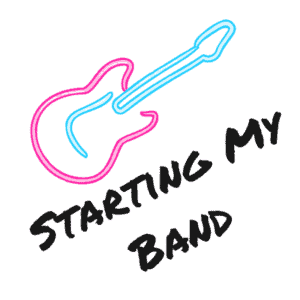Starting a band can feel overwhelming at first. You have a dream and a goal, but getting there feels like a mountain to climb.
I broke the process of starting your own band down into smaller checks for you so that it’s simple and straightforward to follow along.
This is the route I took with various of my previous bands and I am happy to recommend you follow the same pattern.
Let’s start with the person at the centre, and that’s you!
Check 1: Mental Preparation
Getting yourself mentally ready is the cornerstone of your success.
There will be multiple feelings of self-doubt, feeling overwhelmed, being frustrated and not being taken seriously. Take this advice from a guy who signed a record deal aged 22. You are still inexperienced and being seen as a child in the industry.
Let’s ask ourselves a few critical questions:
- Can I deal with failure?
- Am I OK with not reaching my dreams?
- Am I OK with investing time into a project that might fail?
- Do I have an alternative day job to finance my new hobby?
If the answer is yes to all these questions, and you are fine with knowing that your band might not go anywhere, then I you are ready for the next check.
Check 2: Physical Preparation
You are currently still dreaming about your presence on stage performing to an audience, but how good are you on your instrument?
Learn your instrument
Whatever instrument you are passionate about playing, learn to play it. There are plenty of instrument tutorials available on Udemy, and YouTube, and music lessons are also worth it if you can afford them.
I wrote a post about my experience learning to play bass guitar as a teenager which helped me become a musician and get to the stage in a few months. Don’t miss The Easiest Instrument to Learn to Start Your Band Now here.
Make sure you learn a few easy cover songs along the way which you can play along and get a really good feel for.
Getting Geared Up
Make sure you get all the gear you would need.
Core stuff:
- Your instrument
- An amplifier
- Enough instrument cables
- Pedals
- A trustworthy tuner
- etc.
Secondary Stuff:
- Microphone & Stand (if you are not the singer)
- A PA is great to have
- Spares & extras
You want to be prepared and ready to go and feel comfortable with the things that you need.
As a start, get some secondhand equipment for Facebook Marketplace to get yourself ready and prepared.
I used an old bass drum pedal suitcase as the band equipment bag. It served me well until I forgot it at a gig one night. Of course, the sound engineers didn’t have a clue what I was talking about until I saw them with my suitcase and gear at the next show.
This reminds me to Label Your stuff!! (Please learn from my mistakes. It will save you money 🙂 )
Check 3: Networking
Networking is your bread and butter to get further in the music industry. From building bridges with venues and sound engineers to getting to know other musicians and what their influences are.
During your build-up to starting your band, it’s valuable to have a few contacts on hand that you could dial up when you’ll need to make use of their services.
Attend Local Band Nights
This is great to get a feel for the industry. Get to know how gigs work from the doorman to the backstage (if you can manage this).
I usually make an effort to greet the sound engineer and compliment him on the sound. They are the least observed individuals, but they play the biggest role, other than the performers to make the night a success.
Make friends with local musicians
You need to get in touch with other interested musicians with whom you can get to know and build a bond.
Places where you can do this include:
- Facebook musician groups
- Local community spaces
- At the concert venues and band nights
- Etc.
Check 4: Get Your Band Together
Now we get to the phase where you finally get to assemble your dream team.
In my opinion, it’s valuable to start with having one trusted individual at first so that you guys can assemble and find the other members together. Make sure that your interests are similar and that you are both on the same wavelength.
Start with having arranged jam sessions just to bond and socialise. The time outside of the band arena is crucial for building the band chemistry and longevity of the members.
If your location is important, I recommend scanning through my article How to Find Band Members Near You.
If you are more concerned about having committed people, then How to Find Committed Band Members will be of better value to you.
These above articles will guide you to finding band members that are like-minded to you, and there for the long run.

Check 5: Finding a Practice Routine
This can be a massive challenge for many bands, so I’m going to break it down for you:
Finding a Practice Venue
Here are some ideas or solutions that worked for me in the past:
- Usually, the drummer has a good idea of where to practice since he needs to practice in a soundproof area.
- A house or a room of another band member that stays in a more isolated area.
- A local church
- also has bands that need to practice regularly.
- A band member’s workplace
- As a teacher, we have a music room with drums and a PA already set up.
- Check for soundproof rooms in the local newspaper or community groups.
- Storage units that will allow or block out the noise.
Find a Practice Time
This is even today a struggle for me to find the practice time for the whole band during our busy modern-day programs.
Everyone has family or work or personal stuff to deal with.
Even though being in a band takes up some commitment, we need to have the human factor in mind. It will always be about giving and taking.
I wrote in a previous blog post the methods and platforms that I can recommend that you organise appropriate practice times with your band.
Perhaps you’ll find more than you’re looking for!
Communicating the Schedule with the Rest of the Band
The First Practice
Your first practice should be a mix and variety of things:
- Get to know each other by sharing influences and expectations
- Play a few songs together to gel and get the feeling of the general musical standard
- Talk about hobbies and other useful skills.
- There are plenty of valuable skills that we can use when being in a band.
- Check out the 13 Best Side Jobs for Musicians article for more tips!
- Gear sharing
- It’s like stocktaking: check what you have if everyone put their things together.
- Check what you need and what you could do to get these items.
- Talk about your band rehearsal etiquette
- It’s uncomfortable to talk about so get it over with
- It’s better to sort it out now than when it becomes a problem.
- Set some goals for your band
- This encourages members to believe in your project.
- It motivates everyone to practice and stay committed.
These might take a practice or two to get through, but when you’ve reached them, you’ve laid a solid platform to move forward!
Your members will feel like they are being taken seriously and that you are well-organised and ambitious. This gives people hope and direction.
Warning: You might sound terrible at first! But don’t worry, it won’t be like this forever. You will learn to grow together and develop your own unique sound.
Building Consistency and Routine
Having consistent practices built into our routine is worth gold.
How often does a new band need to practice?
This will depend on your goals and if you already have gigs lined up.
If all the members are beginners, I would suggest starting with 2 practices per week, where each band member practices individually at home during the off days.
The more experience you gain and the greater your song repertoire grows, the less time you’ll need to spend practising.
I wrote a short and sweet, but powerful blog post about How Often to Practice Your Band that will steer you into the way of setting your expectations accurately.
This post was written and published by De Wet from startingmyband.com on 25.06.2023. The content was stolen from me if this blog post is seen anywhere else.

Check 6: Writing Your Own Music
Writing original music in a band normally in 2 different ways:
1. The guitarist plays a riff during band practice that he has been working on and everybody starts to jam the song together.
The members go home and revise their parts. When it’s time for band practice again, all the instruments and creative minds come together, and in the end, you have completed your first original song.
The advantage is that this is a quick and easy method to write one or two original songs per week, depending on the amount of content your band members have to present.
The disadvantages are that it can sound less dynamic and less inspired since the songs will start to sound the same if the members aren’t pushed to expand their boundaries.
2. You can go home, write a song, and teach the band the whole song from start to finish.
Here the advantages are that the songs will sound more inspirational, have a consistent sound without sounding too much alike, and be more dynamic.
The disadvantages are you’ll need to teach each member their part and you will spend most of the practice on what each person would do. Another is that the band will be at risk to feel a little bit like a dictatorship.
But with good relationships and the share of responsibilities in the band, the second method is my preferred one.
I would rather have one person writing consistent music and others in the band have other jobs or responsibilities. Then the writing of songs just becomes another job and not total control of the band.
My frontman enjoys writing songs and getting positive feedback for his work. This makes him feel proud and that he did something good for others.
Check 7: Your First Gig
Let’s break this up again into smaller parts:
Preparing Your Setlist
As soon as you have three songs prepared, start to keep an eye out for opening opportunities.
I am not a fan of delaying your first performance. I believe in learning by doing, and for you to have that first taste of the stage experience will be motivating and exciting.
Please go ahead and scan through my article about How Many Songs You Need To Gig so that you get a better understanding of each amount of songs.
If you have a song repertoire ready for a 30-45-minute performance, then I can recommend my setlist suggestion post called Craft Your Setlist Like This.
Getting Into a Venue
Remember we networked already during Check 3? Those contacts we build now come into play.
This is only the start, so aim small and think about the first few gigs as only building experience and building contacts with others.
I suggest starting by playing for a small group of trusted friends and family members so that you can enjoy some feedback from people that you trust and start your career in a very positive and comfortable environment.
The reasons are that the industry is everything but the opposite, and we all can do with a positive and honest start. That’s what you’ll fall back on when there are serious critics falling on you.
I wrote an EXTREMELY valuable post about Steps to Reach Your First Paid Gig – From Zero to Hero from where I would like to extract a certain relevant piece about Playing at a Small Gathering. I feel this would give you the perfect direction for a first performance!!

Check 8: Performing Regularly
So now we would like to enjoy regular stage time.
When I got signed for the first time, our label asked us to gig twice a week. Now, for an original band, I knew these gigs don’t just fall from the sky, especially not if you value your credibility and you perform for cash.
But being on stage and performing is very important for a new band.
The reasons include:
- Promotion of your music
- Collecting more fans to your following
- Becoming more comfortable on stage
- Showing commitment and loyalty
- CONSISTENCY
- Individual experience
- Showing variation in your set
- Networking with the crew and other artists
- Etc
I can seriously go on until tomorrow with this list. Just make sure you get on stage. Whether it’s 3 or 10 times per month, the start will be harder, but the more you push through, the more you’ll get booked and your paid gigs will roll in.
Yes, I also published a blog post about this: What to Do to Get Booked Regularly as an Artist.
Check 9: Recording Your First Music
Perhaps the go-to version would be to place your phone in the band room and press record.
That’s a great way to hear yourself improve, but not the type of recording we would need for a proper demo.
In the modern day, we don’t release albums that often like we have in the past, but we rather focus on singles until an album is completed.
So when you have about 4 singles ready, book a time at a recording studio and get it done. It costs a bit, but that’s what hobby budgets are there for.
Another alternative is to refer back to check 3 and find a sound engineer that also does recordings, perhaps for cheaper than the studio type.
My first band demo was recorded in a garage! And the people loved it! Nobody realised that it wasn’t in a studio and it even received some radio play!
It’s about getting the job done, no matter what it takes. We can improve circumstances after the first recording.
If you are doubting the need to record, maybe you’ll find my blog about Vital Reasons to Record Your Band Demo useful.
Check 10: Release Day
What an exciting day! You have been waiting for the day that your music can be released for all you can remember, but then… Nothing…
Let’s talk about a few things that can make your single releases explode:
- Try to shoot a music video
- Launch it with your single
- Yes, music videos are VERY relevant in the modern day
- Another chance for you to present yourself on another platform
- Set up social media accounts
- How else will you advertise gigs, merch, interact with your fans etc?
- In the modern day, you can even get away with not having a website if you have a solid social media game.
- Have a build-up plan for your single release
- Here’s my free guide to Your Social Media Plan to Build Hype 30 Days Before the Single Release
We need to force the release hype since it’s your first single. As soon as it’s launched, it’s time to get back on stage again.
Check 11: Focus on Your Image
Now you’re set on a solid pathway. Your band foundation is laid on a solid platform and now you can cruise and redo most of the above.
A good next step would be to focus on your image. This is how an audience will remember you. it doesn’t need to be only about what you look like, but also what you stand for.
Your band image should be something that the whole band as a unit feels comfortable with and that you can carry on doing for the rest of your lives.
I wrote a detailed post about Your Image As an Artist to guide you to a respectful image. I believe that one should stay humble and true to the younger version of oneself since it’s the younger us that started the dream to become a musician.
I would want the child in me to see myself feeling proud and excited about his future because he is a rockstar in the making!

Check 12: Rock Your Interviews
Now is the time to send out your Media Press Kit to all the radio stations, podcasters, artist bloggers, and TV shows and create awareness of your existence.
You won’t get contacted and invited at first, but you are making the whole world aware of your release and that you are actively performing.
Your interesting image will get stuck in people’s minds. Perhaps you will be an interesting alternative to interview and explain who you are to the wider audience.
But first, we need to prepare you with a few things to say live on air. You can find my guide to Rock Your Radio Interviews for Bands and Musicians right here.
What else would you include in the checklist for starting your band as a tip to other musicians?
Go ahead and add your points in the comments.
Feel free to scan through my post about 11 Things New Artists Get Wrong to know what to look out for!
Until next time.

